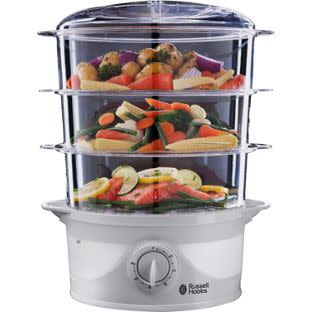Diet and breast cancer: what to eat to lower your risk

You know it's important to get a healthy, balanced diet – but do you know what foods you should eat to lower your risk of breast cancer? If you aren't already following a Mediterranean (high in vegetables, fruits, whole grains, fish, nuts, and olive oil, and low in dairy products and red meats), you might want to start now.
Researchers in Spain looked at the diets of more than 4,000 women and found that those who followed a Mediterranean diet supplemented by four tablespoons of extra virgin olive oil per day were 68% less likely to develop breast cancer than women who followed a standard low-fat diet.
Here are more foods you should eat and cut back on to lower your risk...
Cut back on saturated fat
Several large-scale studies have found that eating a diet high in saturated fat can double your risk of developing breast cancer. Experts believe that fat in the diet increases the levels of oestrogen and other hormones in our blood, and suggest that women should eat no more than 20g of saturated fat a day. For most of us, this means cutting right back on butter and lard, pies, cakes, crisps, biscuits, fatty cuts of meat, sausages, bacon, and cheese and cream.
Eat more 'good' unsaturated fats
In contrast, eating 'good' fats offers some protection. Research suggests that women who eat a diet high in fish oils (marine omega-3 polyunsaturated fatty acids) have a lower breast cancer risk than people who only eat small amounts. As outlined in the video, eating a Mediterranean diet supplemented with extra virgin olive oil was found to reduce breast cancer risk by 58% in one study.
Eat more calcium
Some studies suggest that women who eat a diet high in calcium show a lower risk of breast cancer. Make sure you're getting enough by including diary in your diet (milk, yoghurt and cheese), as well as fruit and vegetables, such as figs, leafy greens and brocolli.
Cut back on sugars & carbohydrates
A large-scale US study of Chinse women aged under 50 found that those who ate a high carbohydrate diet had a slightly higher risk of developing breast cancer. There's another good reason to cut back on sugar. Being overweight significantly increases the risk of breast cancer, especially in post-menopausal women.
Eat more fibre
Fibre is found mostly in fruit, vegetables and whole meal cereals (particularly whole grain). There is some evidence that diets containing more than 25g of fibre per day reduce the risk of breast cancer in pre-menopausal women.
Eat more fruit and vegetables
Studies show that people who eat lots of vegetables and fruit (seven portions a day) and less likely to develop a number of cancers, including breast cancer. When it comes to choosing veggies, opt for those that contain carotenoids, such as carrots, sweet potatoes, spinach, kale, greens, papaya, bell peppers, and tomatoes. Women with higher levels of carotenoids in blood samples may have a lower risk of breast cancer. Eating plenty of flavonoids (found in onions, broccoli and fruits) is also known to lower your risk.
Cut back on alcohol
Alcohol consumption is linked to an increased risk of several types of cancer, including breast cancer, and it's not just heavy drinkers who are at greater risk. According to Cancer Research UK, regularly drinking a pint or a large glass of wine a day, just three units, increases the risk.
Three kitchen gadgets to help you eat healthily:

Bella BEJU01 Whole Fruit Juicer, £59.99

Russell Hobbs 21140 3 Tier Steamer, £19.99

Morphy Richards Soup Maker, £49.99
Related videos:




